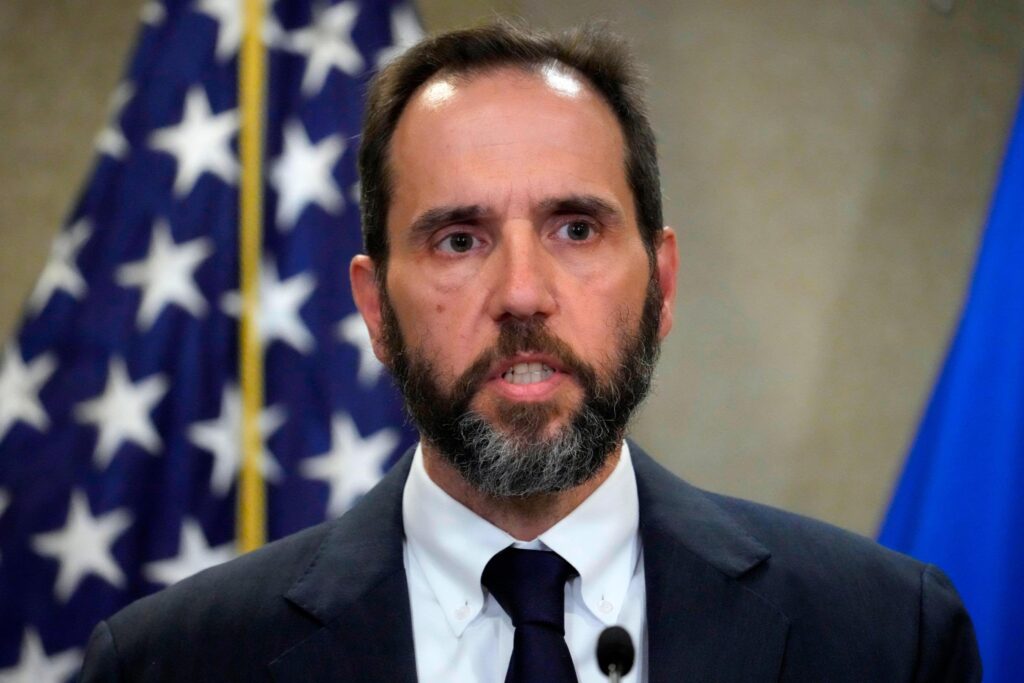Note: If you wish to receive, via e-mail, (1) my weekly newsletter or (2) daily copies of these posts, notify me at rrbates1951@gmail.com and indicate which you would like. I promise not to share your e-mail address with anyone. To unsubscribe, send me a follow-up email.
Monday
One of the six unindicted co-conspirators in Donald Trump’s coup plot recently made a Victor Hugo reference that is worth exploring. Jeffrey Clark, a former Department of Justice member and without doubt co-conspirator #4 in the indictment, has compared special counsel Jack Smith to Javert, the police inspector in Les Misérables.
For his part, Smith in his indictment says that Trump saw co-conspirator #4 (Clark) as a way to bypass Jeff Rosen, the acting attorney general, who was opposing Trump’s plot. Trump wanted to appoint Clark as attorney general so that Clark could use the Justice Department’s imprimatur to spread “knowingly false claims of election fraud.” Only threats of mass resignations at the Department of Justice thwarted the appointment. A Washington Post article summarizes what the indictment says about the attorney general wannabe:
Clark circumvented department leadership to speak with Trump multiple times in late December and early January, according to Tuesday’s indictment. Prosecutors allege that Clark encouraged Justice Department leaders to sign a draft letterto officials in key swing states declaring that the agency had reason to doubt the legitimacy of their elections and encouraging them to send alternate slates of pro-Trump electors to Congress.
When persuasion failed, Clark turned to threats, along with fantasies of Trump using America’s armed forces to maintain his hold on power:
After the Justice Department officials refused, the indictment states, Clark “tried to coerce” them into signing the letter by saying that Trump was offering to make him acting attorney general. Clark accepted that offer on Jan. 3, 2021, according to the indictment. Prosecutors portray Clark as having been dismissive when a White House lawyer urged him to rethink his actions, suggesting that riots would erupt in the nation’s cities if Trump tried to remain in office. “That’s why there’s an Insurrection Act,” the indictment alleges that Clark responded, suggesting that protests could be put down by the military.
Smith may be postponing an indictment of Clark and the other co-conspirators because he wants to focus on Trump. After all, their trials can wait until after the election.
Clark is not only in trouble with the special counsel. At present, a D.C. Bar disciplinary office is considering whether to strip him of his law license for his dishonest conduct and his attempt to interfere with “the administration of justice.” In spite of this—or rather, because of it—Clark has become a celebrity in far-right circles and is odds on favorite to become U.S. attorney general if Trump regains office.
It was in the Post’s article about Clark’s new-found celebrity that the Hugo allusion appears:
On Twitter, he has called the investigations of Trump and his allies a “preemptive coup” to keep the former president from power and likened the special counsel to Inspector Javert, the merciless police detective pursuing the protagonist of Victor Hugo’s Les Misérables.
I see where Clark is coming from. Javert, of course, is Jean Valjean’s relentless pursuer, an officer of the law determined to track down the relapsed convict (relapsed by virtue of having stolen a coin from a child after serving his time in the galleys). No passage of time, no change of place, will deter him. He’ll even disguise himself as a beggar to sniff out his quarry. Hugo notes that, when Javert encounters Jean Valjean one last time, “there had been in him something of the wolf which regains his grip on his prey.”
As a former Department of Justice official, shouldn’t Clark be celebrating such qualities? Javert, after all, may be literature’s greatest exemplar of law and order. I can’t think of anyone who surpasses him. He’s even a strong supporter of France’s own Insurrection Act, disguising himself so that he can infiltrate the ranks of the novel’s revolutionaries.
Of course, once one is an insurrectionist oneself, one might look a little less favorably on relentless pursuit. Trump and his confederates are less interested in the strong arm of the law when they are in its crosshairs. In their eyes, only their opponents should be subject to the country’s legal system.
But is Smith indeed a Javert? I actually agree with Clark here as the special counsel seems obsessed with upholding the law in a very Javert-type fashion. Nothing is going to stand in his way. I imagine that Smith might even embrace the comparison.
What we can’t tell yet is whether Smith is one who tempers justice with mercy, something Javert does in the end. Realizing that the man he has pursued so relentlessly is a saint, the police detective violates the foundational principles that have guided his life and lets him go. In this respect, Clark probably would like Smith to be more Javert-like, giving the conspirators a break.
Of course, neither Clark nor his boss is a saint. In fact, were Trump left alone with the bishop’s candles, not only would he steal them but probably assault the two women of the house as well. Smith will have no qualms about locking either man up.


